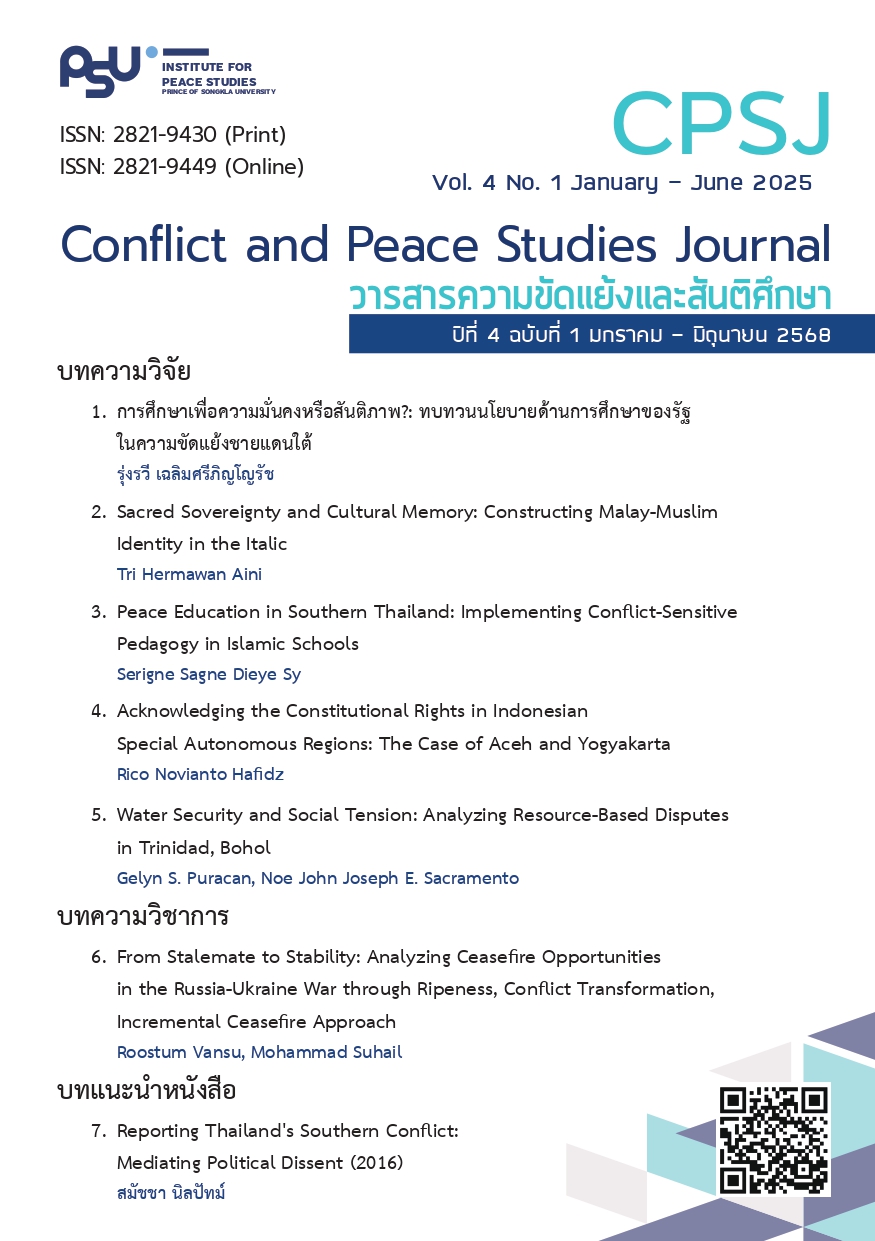การศึกษาเพื่อความมั่นคงหรือสันติภาพ?: ทบทวนนโยบายด้านการศึกษาของรัฐในความขัดแย้งชายแดนใต้
Main Article Content
บทคัดย่อ
บทความนี้ศึกษาและวิเคราะห์วิธีการดำเนินนโยบายด้านการศึกษาของรัฐไทยซึ่งได้ใช้การศึกษาเพื่อบรรลุเป้าหมายในด้านความมั่นคงในพื้นที่ความขัดแย้งในชายแดนใต้ในบทความนี้จะใช้กรอบคิดในเรื่อง “เหยื่อ-ผู้กระทำ-ผู้ปลดปล่อย-ผู้สร้างสันติภาพ” (Victim-Perpetrator-Liberator-Peacebuilder หรือ VPLP) ซึ่งเป็นแนวคิดที่คิดค้นโดย Tejendra Pherali ในการศึกษาบทความนี้พบว่าโดยส่วนใหญ่การศึกษาในบริบทชายแดนใต้มักจะตกเป็นเหยื่อของความรุนแรงและในขณะเดียวกันก็เป็น “ผู้กระทำ” ที่กระตุ้นให้เกิดความขัดแย้งมากกว่าจะช่วยหนุนเสริมการสร้างสันติภาพ โรงเรียนรัฐและครูตกเป็นเป้าหมายการโจมตีเนื่องจากผู้ก่อความไม่สงบมองว่าคนกลุ่มนี้เป็นตัวแทนของรัฐ รัฐไทยใช้การศึกษาเป็นเครื่องมือในการปลูกฝังสำนึกความเป็นชาติไทย การใช้ภาษาไทยและประวัติศาสตร์ไทยที่มีกรุงเทพฯ เป็นศูนย์กลางในการจัดหลักสูตรการเรียนการสอนยังไม่ได้มีการให้ความสำคัญต่อภาษา ประวัติศาสตร์ และอัตลักษณ์ท้องถิ่นมากเพียงพอ สถานการณ์ดังกล่าวมีแนวโน้มแย่ลงหลังการรัฐประหารในพ.ศ. 2557 โดยกองทัพได้เข้ามามีส่วนในการขับเคลื่อนแนวคิด “การศึกษาเพื่อความมั่นคง”
หากเราจะปรับบทบาทของการศึกษาให้ทำหน้าที่ในการสนับสนุนการสร้างสันติภาพ รัฐบาลจะต้องแสดงให้เห็นว่ารัฐตระหนักและยอมรับถึงความหลากหลายของอัตลักษณ์ทางชาติพันธุ์และศาสนาอย่างแท้จริงโดยผ่านการออกแบบระบบการศึกษาเสียใหม่ อาทิ การยอมรับความหลากหลายทางวัฒนธรรมและการเปิดพื้นที่ให้มีการออกแบบหลักสูตรท้องถิ่น ส่งเสริมการศึกษาแบบพหุภาษาบนฐานของภาษาแม่ การประกาศให้มลายูถิ่นปัตตานีเป็นภาษาทำงานในชายแดนใต้และส่งเสริมการศึกษาเพื่อการเรียนรู้ระหว่างวัฒนธรรม โครงการเหล่านี้อาจเป็นรูปธรรมที่แสดงให้เห็นถึงการแปรเปลี่ยนในเชิงนโยบายเพื่อทำให้การศึกษาได้ช่วยหนุนเสริมให้เกิดสันติภาพที่ยั่งยืน
Article Details
เอกสารอ้างอิง
Arphattananon, T. (2018). Multicultural Education in Thailand. Intercultural Education, 29(2), 149–163. Retrieved from https://doi.org/10.1080/14675986.2018.1430020
Centre for the Coordination and Administration of Education in the Southern Border Provinces. (2018). Phaen yutthasat kansueksa khet phatthana phiset chaphokit changwat chaidaen phaktai 20 pi. Songkhla: Centre for the Coordination and Administration of Education in the Southern Border Provinces.
Centre for the Coordination and Administration of Education in the Southern Border Provinces. (2020). Sangkhom phahu watthanatham changwat chaidaen tai: Laksut prawattisat thongthin changwat chaidaen phaktai. Songkhla: Centre for the Coordination and Administration of Education in the Southern Border Provinces.
Centre for Propelling Education in the Southern Border Provinces. (2024). Khomun sarasonthet pi-ngoppraman phoso 2566 khopkhet 5 changwat chaidaen phaktai [Unpublished raw data].
Chalermsripinyorat, R. (2019). The Shifting Battleground: Peace Dialogue in Thailand’s Malay-Muslim South. In M. J. Montesano, T. Chong, & M. Heng (Eds.), After the Coup: The National Council for Peace and Order Era and the Future of Thailand (pp. 140–169). ISEAS – Yusof Ishak Institute.
Chalermsripinyorat, R. (2024). Thailand. Counter Terrorist Trends and Analyses, 16(1), pp. 28–32.
Che Man, W. K. C. (1990). The Thai Government and Islamic Institutions in the Four Southern Muslim Provinces of Thailand. Sojourn: Journal of Social Issues in Southeast Asia, 5(2), 255–282. Retrieved from http://www.jstor.org/stable/41056800
Deep South Watch. (2024). Statistics of Violence [Unpublished raw data], made available to the author.
Harai, W. (2006, June 26). Gen Prem Rejects Key NRC Proposal. Bangkok Post.
Human Rights Watch. (2010). Targets of Both Sides (p. 13). Human Rights Watch. Retrieved from https://www.hrw.org/sites/default/files/reports/thailand0910webwcover.pdf
Keyes, C. F. (2019). Buddhist Kingdom as Modern Nation State. Routledge.
Khoromo kho nayobai phasa haeng chat tang 6 yutthasat samkhan chai phasa chuai khapkhluean setthakit. (2021, June 29). Matichon Online. Retrieved 9 April 2025 from https://www.matichon.co.th/politics/news_2802020
Lo Bianco, J. (2013). Language and Social Cohesion: Malaysia, Myanmar, Thailand (Conceptual Framework, 2013–2014 Work Plan). Submitted to UNICEF East Asia and Pacific Regional Office.
Lo Bianco, J., & Slaughter, Y. (2016). Recognizing Diversity: The Incipient Role of Intercultural Education in Thailand. In J. Lo Bianco & A. Bal (Eds.), Learning from difference: Comparative accounts of multicultural education (pp. 191–219). Springer.
Narongraksakhet, I., & Hajimasae, N. (2010). Thruesadi mai sathaban kansueksa Muslim changwat chaidaen phaktai. Songkhla: Salatan Research and Academics.
National Reconciliation Commission of Thailand. (2006). Aochana khwamrunraeng duai phalang haeng samanchan. Bangkok: National Reconciliation Commission of Thailand.
Office of the Prime Minister’s Office. (2021, 21 May). Rueang kho khwam henchop (rang) phaen pati bat kan dan nayobai phasa haeng chat (phoso 2564-2565). [Copy in possession of author].
Pathan, D. (2015, June 27). Bangkok Lacks the Will to Make Peace in Deep South. The Nation. Retrieved 9 April 2025 from https://www.nationthailand.com/perspective/30263252
Pherali, T. (2022). Conflict, Education and Peace in Nepal: Rebuilding Education for Peace and Development. Bloomsbury Publishing.
Pitsuwan, S. (1985). Islam and Malay nationalism: A Case Study of the Malay-Muslims of Southern Thailand (pp. 188–190). Thai Khadi Research Institute, Thammasat University.
The Senate Committee on Military and National Security. (2022). Kan thopthuan kitchakam kansueksa phuea khwam mankhong nai phuenthi changwat chaidaen phaktai. Bangkok: The Senate Committee on Military and National Security.
UNESCO. (2005). Convention on the Protection and Promotion of the Diversity of Cultural Expressions (Article 8). Retrieved from https://unesdoc.unesco.org/ark:/48223/pf0000142919
UNESCO. (2006). UNESCO Guidelines on Intercultural Education. UNESCO. Retrieved from https://unesdoc.unesco.org/ark:/48223/pf0000147878
UNICEF. (2014). Thailand Case Study in Education, Conflict and Social Cohesion. UNICEF East Asia and Pacific Regional Office.
UNICEF, & RILCA. (2018). Bridge to a Brighter Tomorrow: The Patani Malay-Thai Multilingual Educational Programme. UNICEF. Retrieved from https://www.unicef.org/thailand/reports/bridge-brighter-tomorrow

